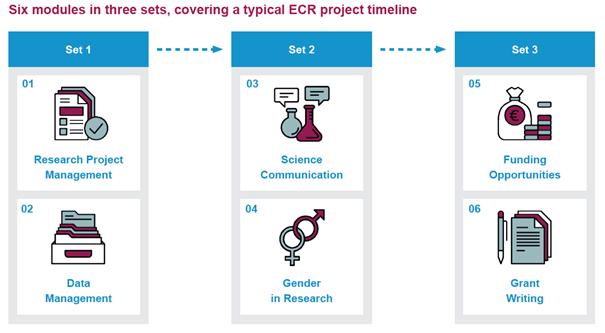Transferable skills training in MSCA-DNs – from proposal, grant preparation to project
25th April 2024 at 2:37 pm
Whether you are riding the high of recent funding success from the 2023 MSCA Doctoral Networks (DNs) call or reflecting after grant rejection, this blog post series is for you! With the results from the HORIZON-MSCA-2023-DN-01 call released only a couple of weeks ago, it is now time to start the grant agreement preparations (GAP) for the successful proposals and work on improving the unsuccessful ones for resubmission by the next deadline scheduled for 27 November 2024.
As you have probably experienced, one key component of any MSCA DN is the training of doctoral candidates, and getting the training programme right is instrumental for a successful proposal and project. This is where training in transferable skills comes into play and, if done right, can greatly enhance the quality and impact of your training programme.
In this first blog post of a three-part series, we focus on the key steps to take during the GAP phase of an MSCA-DN to ensure that the training programme is of the highest quality, and all is in place for a successful project start and implementation. For our top recommendations on how to set up a solid training plan in view of the next MSCA-DN call for proposals opening on 29 May 2024, we will soon be publishing a second blog post dedicated just to that.
Polishing the training programme during grant agreement preparations
The 128 MSCA-DN proposals that were recently invited for contract preparation by the European Commission are currently busy with the crucial phase of grant agreement preparation (GAP) with the Research Executive Agency (REA). This is a highly structured process with tight deadlines, that will most likely involve a few edits and changes to be made to the content of the submitted proposal prior to defining the final Grant Agreement.
While successfully selected for funding, it may well be that the training programme received a few comments for improvement by the reviewers, most likely concerning those skills that complement the technical and scientific training. Now is the time to address these and ensure that the doctoral candidates (DCs) will also be trained on the transferable skills that they will require to confidently manage their projects and prepare for the job market. While training in some of these skills is offered as part of the doctoral programme curriculum by the beneficiary institutions within an MSCA-DN, they should be complemented by additional ones provided by Associated Partners within the DN. Which transferable skills to include in the training programme will depend on several factors, but we recommend considering the needs of the individual research projects planned in the DN as well as those of the current job market and potential future employers of the DCs. Below is a rather long and diverse list of transferable skills that could be relevant, compiled by our DN experts at accelopment.
| Adaptability | Digital design | Proactivity |
| Big data analysis | Entrepreneurship | Programming |
| Business model development | Ethics in research | Project management |
| Collaborative research | Ethics in science communication | Public engagement |
| Communication | Funding knowledge | Public speaking |
| Complex problem solving | Gender-sensitive research practices | Quality assurance |
| Creativity | Grant writing | Research project management |
| Critical thinking | Innovative thinking | Resilience |
| Data management | IP management | Science communication |
| Data visualisation | Leadership | Self-direction |
| Decision making | Mentorship | Teamwork |
| Delegating | Networking | Time management |
Identifying the required skills is one part, but the next important step is ensuring that the professional delivery of these to the DCs can take place through tailored training that fits within the network’s training programme. If not already identified during the proposal writing phase, it is highly advisable to find the right Associated Partners for delivery of any training activities already during the GAP. Despite it being possible to make changes in terms of Associated Partners at any point throughout the project, including them already at this stage will certainly save additional administrative efforts and contractual changes at a later point. Confirming the involvement and commitment of all Associated Partners early and updating them on the progress of the project from the very start will also help create a more cohesive and supportive network.
Transferable skills training for early-career researchers
Whether continuing with research in academia or industry or transitioning to new roles, acquiring a set of transferable skills is ever more critical for early-career researchers (ECRs). In many cases, they will need to manage diverse (research) projects, stakeholders, and data; communicate with a variety of audiences; and find ways to finance their innovative ideas. Transferable skills training has long been a key component within MSCA projects, and it is also a highlight of our long-standing experience as partners in MSCA networks, alongside the support we at accelopment provide for grant agreement preparation, administrative project management and outreach activities. It is from this experience and our passion for sharing knowledge that our Transferable Skills Training Programme was born. We identified six key competence areas and developed a training module dedicated to each of these: 1) Research project management, 2) Data management, 3) Science communication, 4) Gender in research, 5) Funding opportunities, and 6) Grant writing. The modules are specifically tailored to the needs of researchers in ongoing DNs and COFUND projects that are also part of the MSCA programme. With the opportunity to choose as few as just one or as many as all six modules, they can be flexibly integrated within existing training plans or added to enhance the development of new ones. Designed for real-time online delivery and adaptable to showcase examples and activities tailored to the research area of the participants, the six modules ideally equip the participants with the skills they need along the different stages of their project timeline.

Developed with the DCs in mind, our Transferable Skills Training Programme supports eraly-career researchers in building competitive skill sets for their current and future projects.
The best support from proposal and grant preparation to project
As an Associated Partner for training, administrative project management and outreach support in 11 ongoing Horizon Europe DNs, including the recently started DarChem DN and MobiliTraIN, and as a Partner Organisation in over a dozen H2020 Innovative Training Networks (ITNs), at accelopment we have what it takes to guide project partners in designing a complete and suitable training programme for their MSCA-DN. Our experienced trainers enjoy the dynamic atmosphere that is created when working with early-career researchers, and regularly deliver interactive training journeys that support the development of well-rounded skill sets. Reach out to our team to learn more about how we can work together, be it during the grant agreement preparation phase of your new project or during the proposal development stage of your next proposal.

Jacqueline Strehler
Research & Innovation Project Manager
